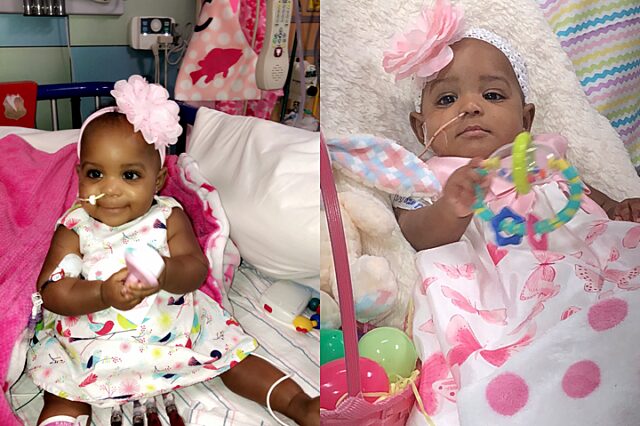Artificial device mends a baby girl’s broken heart

Ceara Curry and her husband, Kenton, were brand new to parenthood when their baby turned into a miracle.
At 6-months-old, Ceara and Kenton’s daughter, Kennedy, contracted what they believed was a common cold. Her pediatrician told Ceara that her baby had allergies, but Kennedy worsened overnight.
“I knew something was off,” Ceara said. Time would prove that her instincts were correct.
Ceara took her daughter back to the pediatrician, and the doctor suspected they heard a heart murmur. An X-ray revealed that Kennedy had an enlarged heart.
The Curry family was instructed to take Kennedy to UF Health Shands Children’s Hospital. Upon their arrival at the UF Health Congenital Heart Center, doctors discovered that Kennedy’s heart was failing.
“It was very, very terrifying,” Ceara said. “As a mom with a completely healthy baby, we went from being told it was allergies to it being heart failure a week later. We were crushed.”
Kennedy was diagnosed with dilated cardiomyopathy, a disease of the heart muscle that causes the ventricle to stretch to a point where it can’t healthily pump blood to the body. Her heart was pumping at only 8 percent.
Kennedy worsened overnight in the pediatric cardiac intensive care unit, and didn’t respond to medicine.
“I was heartbroken,” Ceara said. “We didn’t know if she was going to make it.”
But the team of clinicians didn’t give up hope. Desiree Machado, M.D., a pediatric critical care physician at UF Health Shands Children’s Hospital, and a team of specialists stood outside Kennedy’s room to monitor her during that critical first night. Machado and team kept a close eye on Kennedy to see if she would need to be placed on extracorporeal membrane oxygenation, or ECMO, a life support machine that puts oxygen in the blood and removes carbon dioxide. All the meanwhile, Kennedy remained heavily sedated as her heart function stabilized.
On March 21, 2018, Kennedy was placed on the Berlin Heart®, an artificial heart device made specifically for babies and children facing heart failure. The device supported Kennedy’s heart function as the Curry family awaited a new heart.
“I felt selfish praying for a new heart for her,” Ceara said. “I started praying for healing, and she got it.”
After 3-and-a-half months of waiting, Kennedy’s failing heart did the impossible – it got better.
“Her heart started competing with the machine,” Ceara said. It wasn’t before long that Kennedy’s doctors began a weening process and allowed her heart to pump on its own.
On June 25, 2018, Kennedy was disconnected from the Berlin Heart®, and no longer needed a heart transplant.
“The whole experience was amazing,” Ceara said. “It definitely led us to appreciate life and the little things more.”
During the four months Kennedy was in the hospital, Mark Bleiweis, M.D., the director of the UF Health Congenital Heart Center and the chief of congenital cardiothoracic surgery; Dipankar Gupta, MBBS, D.C.H, M.D., a pediatric critical care physician; and Machado, kept Ceara and Kenton a part of the treatment plan for their daughter. As new parents, it was important for the Currys to know each step of the process, and the team allowed Ceara to continue to care for Kennedy as a mother.
Now, as a healthy 17-month-old, Ceara says Kennedy is a firecracker. She enjoys walking and exploring, and she has found a particular love for sweet potatoes.
“My daughter had not seen the sunlight in four months,” Ceara said of Kennedy’s time in the hospital. “This is a whole new world for her. She’s making up for lost time.”
Through it all, Ceara and Kenton held on to their faith and their trust in Kennedy’s doctors.
“I’m thankful for the PCICU,” Ceara said. “If I had to recommend a children’s hospital to anyone, it would be UF Health Shands Children’s Hospital.”
About the author
